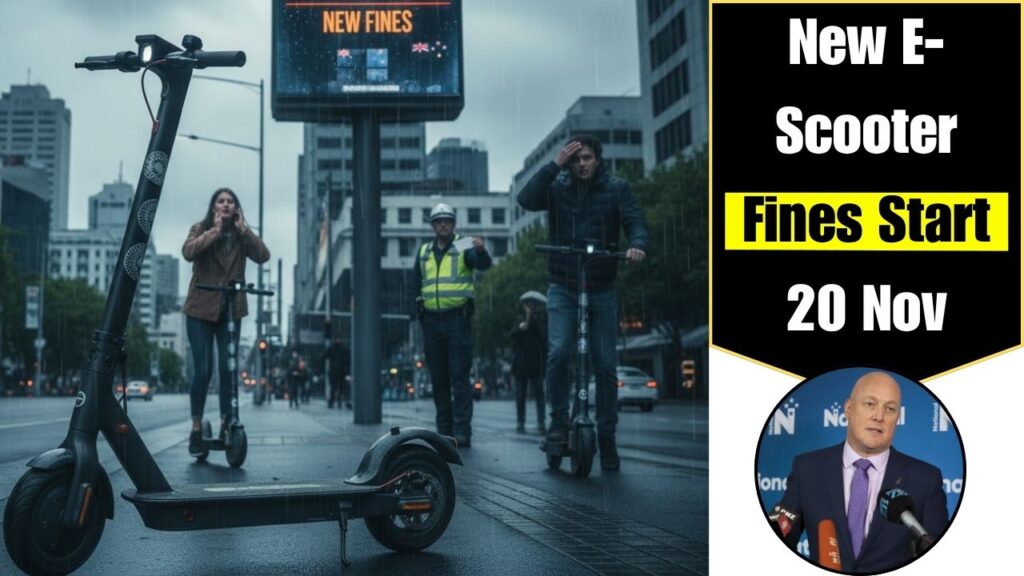NZ Electric Scooter Regulations – New Zealand has announced stricter regulations for electric scooter riders starting from 20 November 2025. The new rules aim to improve road safety, reduce reckless riding, and ensure better compliance with local traffic laws. As e-scooters continue to gain popularity across the country, the government is focusing on balancing innovation with public safety. Under the updated regulations, riders may now face penalties for not following specific road and safety guidelines. These changes are designed to protect both pedestrians and riders while promoting responsible e-scooter use throughout New Zealand.

New Electric Scooter Rules for New Zealand Riders
The revised electric scooter laws in New Zealand focus on accountability and safety. From 20 November 2025, riders must follow new helmet mandates, parking restrictions, and maximum speed limits in shared zones. The Transport Agency has emphasized the importance of rider awareness and compliance to prevent accidents. Failing to follow these guidelines can now result in higher fines or temporary license suspensions. These updated e-scooter regulations ensure smoother integration of scooters into the transport network while maintaining the safety of pedestrians and the well-being of riders across major New Zealand cities.
 NZ Grocery Price Relief Scheme Launches 20 November 2025 – Budget-Smart Support for Kiwi Households
NZ Grocery Price Relief Scheme Launches 20 November 2025 – Budget-Smart Support for Kiwi Households
Penalties and Fines Under New Zealand’s 2025 E-Scooter Policy
With the tightening of e-scooter laws, penalties for non-compliance have also increased significantly. Riders found violating the updated rules could face on-the-spot fines ranging from NZ$150 to NZ$1,000 depending on the severity of the offense. Common infractions include speeding in shared spaces, riding without helmets, or blocking footpaths. The New Zealand Police and local councils will work together to enforce the new measures strictly. The government hopes that by introducing tougher penalties, there will be a clear reduction in unsafe e-scooter practices and better respect for road users.
| Rule/Aspect | Details |
|---|---|
| Effective Date | 20 November 2025 |
| Helmet Requirement | Mandatory for all riders |
| Speed Limit | 15 km/h in shared zones |
| Fine Range | NZ$150 – NZ$1,000 |
| Responsible Authority | NZ Transport Agency & Local Councils |
Impact on New Zealand Communities and Urban Transport
The new e-scooter framework is expected to positively influence New Zealand’s urban mobility. While some riders may initially find the restrictions inconvenient, the long-term benefits include safer public spaces, fewer road accidents, and clearer usage rules. City councils across New Zealand towns are planning designated parking zones and improved scooter lanes to accommodate growing demand. The initiative also supports the government’s sustainability goals by promoting eco-friendly travel options that coexist responsibly within city infrastructure.
Government’s Future Plans for E-Scooter Regulations in New Zealand
The New Zealand government intends to monitor the results of these new laws closely and make adjustments as needed. Future considerations may include rider licensing requirements, insurance policies, and stricter road safety education for electric scooter users. Authorities also aim to collaborate with e-scooter companies to ensure compliance and user accountability. As technology evolves, the government’s proactive stance ensures that safety remains a top priority while supporting modern transportation trends across New Zealand.
Frequently Asked Questions (FAQs)
1. When do the new electric scooter rules in New Zealand take effect?
The new electric scooter regulations come into force on 20 November 2025.
2. Is wearing a helmet mandatory under the 2025 e-scooter laws?
Yes, helmets will be compulsory for all e-scooter riders under the updated safety regulations.
3. What are the fines for breaking the new e-scooter rules?
Fines range between NZ$150 and NZ$1,000 depending on the violation type and severity.
4. Who will enforce the new electric scooter regulations in New Zealand?
The New Zealand Transport Agency and local councils will be responsible for enforcement and monitoring.



